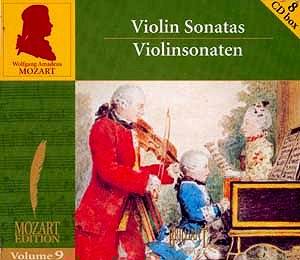This ninth volume in the Brilliant Classics complete Mozart
edition includes all of Mozart’s violin sonatas, including the earliest
works composed by Wolfgang with his father Leopold, when Wolfgang was
only seven years old.
The first disc of this recording contains some of Mozart’s
earliest works, four sonatas which are not actually for violin and harpsichord,
but for harpsichord with violin accompaniment. These are more harpsichord
works, and it seems that the originals were written by Leopold from
Wolfgang’s improvisations as a young child. The violin parts were added
to the pieces later. These simplistic works are of interest because
they are some of the earliest Mozart works, but musically have little
to offer. It is good, though, to hear them played on harpsichord, and
the performances of these works are fine, though at times the violin
is a bit too loud, and takes centre-stage, while it should be merely
accompanying the harpsichord, not leading it.
Sonatas KV 26 to 31 were written much later; Mozart
was already 19, and the differences are obvious. More brilliant, more
sparkling, the harpsichord expresses much more energy and lacks the
heavy pedantic sound of the earliest works. In the Sonata in B flat
major KV 31, one can hear the violin take its rightful place as a solo
instrument, no longer just as accompaniment to the harpsichord. While
this does not yet "sound" like Mozart, it does sound like
a composer with something to say. The two sets of variations on French
songs on this second disc are interesting - performed on violin and
pianoforte, they begin very simply but develop into complex, virtuosic
works. They are both fairly long - at 14 and 9 minutes - and get better
as they go on. The first piano works written by Mozart, these are very
well played, and the sound of the pianoforte is lovely.
The remainder of the set brings us to more familiar
territory. Played on modern instruments, the rest of the sonatas follow
Mozart’s career as he develops more complex and musically satisfying
material.
These discs are very inconsistent - some of the performances
are full of energy and vigour, and the allegro of the E flat major sonata
KV 380 is a fine example of this: there is real drive and rhythmic energy.
But the sound detracts from the performance; the violin is often too
distant, and is drowned out at times by the piano. In the G major sonata
KV 379, violinist Salvatore Accardo’s tone is off at several points;
in many of the other works, he is way too far in the background, and
in some he is much too present. At times, the two musicians sound as
though they are each playing their parts separately, as if there is
no cohesion between them.
But occasionally, when it gels, the music is wonderful.
The andante of the A major sonata KV 526 is a beautifully sculpted soundscape,
with subtle lines and phrasing, and very emotional playing by Bruno
Canino on piano, and an excellent balance between the instruments. The
slower movements seem more suited to these musicians, and the results
are much more effective, but the faster sections are more confused and
unbalanced.
Overall, this set has its highs and lows. The early
sonatas, less interesting musically, are well performed and the instruments
give them a truly "authentic" sound. The later sonatas, however,
are too unequal, and the sound too unclear at times to deserve recommendation.
Nevertheless, none of them are played poorly, and, given the bargain
price of this set, as of the other Brilliant Classics set, this could
be a choice for someone seeking completeness at a low cost.
Kirk McElhearn


